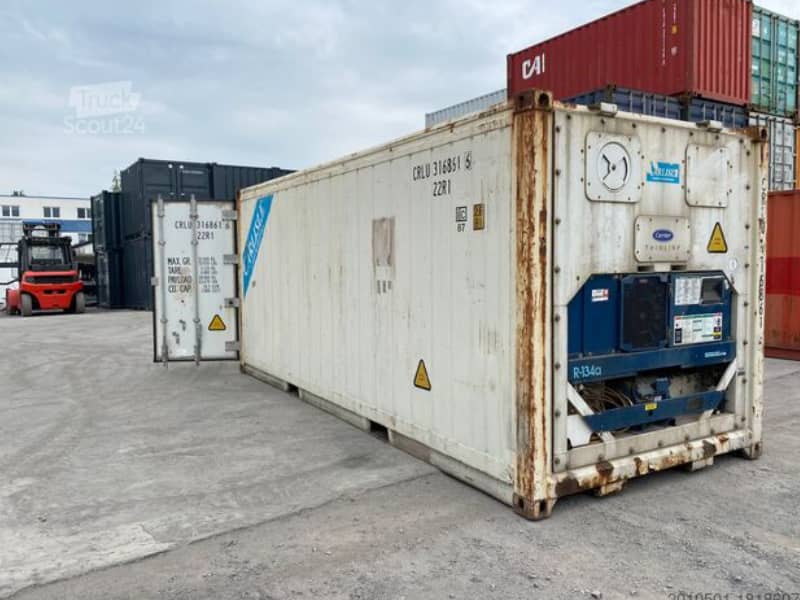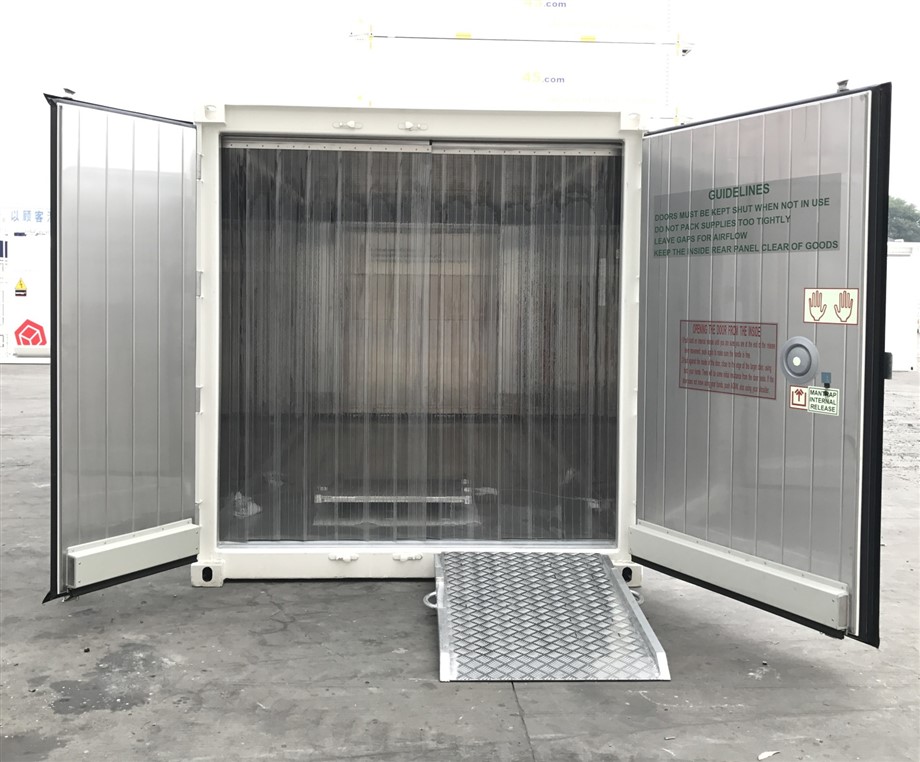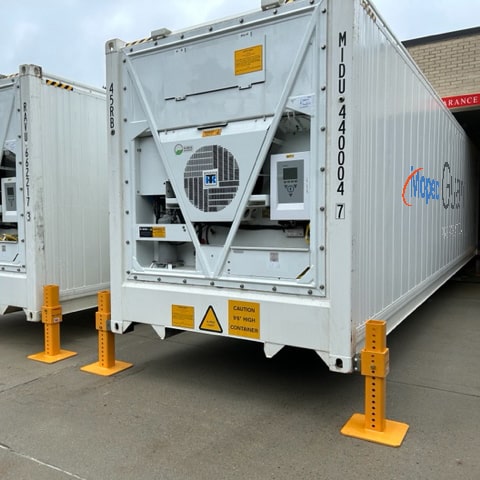Everything About Cold Store Containers: Essential Insights for Your Storage Needs
Cold store containers play a crucial role in the conservation of disposable goods. They can be found in numerous types, consisting of chilled and shielded units, each designed for certain storage space needs. Recognizing the advantages and key features of these containers is important for businesses intending to optimize their procedures. As the need for efficient storage space services grows, checking out the different options offered can result in educated decisions that impact both success and sustainability. What factors should one consider when choosing the best container?
Kinds of Freezer Containers
Cold storage space containers can be found in numerous types, each made to fulfill specific temperature control requirements. Amongst the most usual kinds are cooled containers, which preserve temperatures between 0 ° C to 10 ° C, making them ideal for subject to spoiling goods like fruits, veggies, and milk products. An additional kind is the deep freezer container, which operates at temperatures below -18 ° C, perfect for long-term storage of frozen products such as meats and fish and shellfish.
Insulated containers supply temperature security without energetic air conditioning, making them helpful for temporary transportation of temperature-sensitive items. In addition, there are mobile cold store systems, which provide versatility in places and are often used in events or seasonal operations. Blast refrigerators rapidly lower the temperature of hot foods, making certain safety and security and top quality. Each type offers an one-of-a-kind objective in different industries, from food solution to pharmaceuticals, stressing the significance of selecting the right container for details storage space needs.

Benefits of Utilizing Cold Store Solutions

Chilly storage space services extend the rack life of things, reducing waste and enhancing profitability for companies. By efficiently handling stock with proper temperature level control, firms can enhance their supply chains and improve functional performance.
In addition, cold storage space facilities enable flexible storage space alternatives, accommodating various quantity demands and seasonal changes popular (used 40ft refrigerated shipping containers). This flexibility assists companies react rapidly to market adjustments
Employing chilly storage space solutions can ensure conformity with health and safety guidelines, guarding both organizations and customers. Overall, the strategic usage of cool storage space enhances product management while promoting sustainability and economic viability.
Trick Features to Look for in Freezer Containers
When picking cool storage space containers, numerous key features advantage cautious factor to consider to protect peak efficiency and integrity. Temperature control capabilities are essential; containers should maintain consistent temperatures appropriate for certain products. Insulation high quality likewise plays a significant role, as exceptional insulation reduces power intake and enhances temperature level stability.
Next, convenience of accessibility and loading is important; containers must provide user-friendly designs for reliable handling and organization. Resilience is another vital element; weather-resistant materials ensure durability and secure contents versus environmental elements.
Additionally, flexibility functions, such as built-in wheels or lifting factors, assist in transport, while personalized layouts enable tailored storage space services.
Monitoring systems, including temperature level alarm systems and remote monitoring, provide real-time updates, making specific that problems remain excellent. By concentrating on these attributes, users can choose cold store containers that satisfy their functional demands effectively.
Choosing the Right Freezer Container for Your Demands
Choosing the ideal cold storage container needs a thoughtful analysis of operational needs and particular requirements. Variables such as the type of products being stored, temperature level level of sensitivity, and volume ought to be prioritized. For circumstances, disposable food things might necessitate containers with strict temperature controls, while pharmaceuticals may call for specific problems to keep efficiency.
Additionally, prospective individuals need to consider the container's size and movement. A larger system may be required for bulk storage, while smaller, mobile choices might be ideal for momentary or on-site needs. Insulation quality and power efficiency are also vital, as these will influence functional prices and temperature level stability.
Lastly, conformity with sector regulations and standards is crucial, especially in industries like food and healthcare. By meticulously evaluating these facets, customers can choose a cold storage container that efficiently fulfills their special demands and guarantees optimal storage problems.
Finest Practices for Maintaining Freezer Conditions
Preserving optimal freezer conditions is crucial for preserving the top quality and security of temperature-sensitive items. On a regular basis keeping track of temperature and humidity degrees is crucial; using trusted electronic thermometers and hygrometers can provide check out here precise analyses. Additionally, correct insulation of freezer containers aids reduce temperature level fluctuations and power loss.
Applying a first-in, first-out (FIFO) system assures that older stock is utilized before newer stock, lowering waste (used 40ft refrigerated shipping containers). Furthermore, maintaining an organized design within the storage room permits for better air flow and decreases the risk of cross-contamination
Routine upkeep examine equipment, such as seals and compressors, are necessary to stop breakdowns. Personnel training on ideal practices for loading and discharging products assists keep temperature integrity. Keeping doors shut as much as feasible restrictions warmth exchange, assuring that the chilly storage space setting continues to be efficient and steady in preserving important products.
Cost Factors To Consider for Cold Store Solutions
When evaluating cold store options, it is necessary to think about the initial financial investment expenses together with ongoing functional costs. A comprehensive breakdown of these prices can expose significant long-lasting cost savings potential for companies. Recognizing these monetary elements assists stakeholders make informed choices regarding their cold store demands.

First Investment Costs
The financial landscape of freezer containers offers numerous first financial investment prices that services have to think about. These prices commonly consist of the acquisition or rental cost of the containers, which can vary based upon insulation, dimension, and kind high quality. Furthermore, costs associated with retrofitting existing structures to suit freezer should be factored in, particularly if specialized equipment is called for. Setup costs, consisting of electric work and refrigeration systems, also add to the general first financial investment. Businesses must not neglect transport prices for providing containers to their preferred Check This Out area. Finally, potential customization choices, such as shelving or temperature level monitoring systems, can better impact the preliminary economic outlay. Cautious budgeting for these variables is crucial for successful freezer implementation.
Functional Expenditures Failure
Operational expenses for cool storage services encompass a number of vital price factors to consider that organizations have to navigate. Key factors consist of energy expenses, which can be significant as a result of the requirement to preserve reduced temperatures. Maintenance expenses are additionally substantial, as regular maintenance is crucial to assure devices runs effectively and remains compliant with health and wellness criteria. Additionally, labor costs might emerge from the requirement for specialized staff to monitor the storage and handle environment. Insurance coverage expenditures are an additional factor to consider, as firms should safeguard their financial investments versus prospective losses. Ultimately, any type of possible governing conformity prices have to be factored in, as organizations might require to purchase systems that follow food safety and security and ecological laws. Comprehending these costs is vital for efficient budgeting.
Long-Term Cost Savings Potential
Spending in cold store options provides substantial long-term financial savings capacity, transforming initial expenses into monetary performance with time. By lessening perishing and waste, businesses can boost their earnings margins substantially. Advanced insulation and energy-efficient systems decrease utility prices, which build up over the life-span of the tools. Additionally, cold store containers commonly need much less regular maintenance contrasted to conventional refrigeration approaches, leading to reduced repair service expenses. The capability to store products for prolonged periods without endangering top quality allows services to profit from market changes, optimizing profits. In addition, the scalability of cold store solutions allows firms to adjust to altering needs without sustaining excessive expenses. On the whole, these elements add to an engaging case for chilly storage as a cost-effective investment method.
Regularly Asked Questions
Exactly How Lengthy Can Food Be Stored in Freezer Containers?
The duration food can be kept in cold store containers varies by type. Typically, disposable things last from days to weeks, while icy foods can continue to be safe for months, depending upon appropriate temperature and storage space problems.
Are Cold Storage Containers Energy-saving?
The power performance of cold storage containers varies based upon design and insulation quality. Modern units usually make use of innovative modern technology to minimize energy consumption, ultimately contributing to reduced functional prices and ecological influence in long-lasting use.
Can Cold Storage Containers Be Customized for Particular Needs?
Freezer containers can certainly be customized to meet details demands. Alterations might include temperature controls, dimension changes, and extra functions, allowing users to customize services efficiently for various storage space needs and operational preferences.
What Are the Usual Dimensions of Cold Storage Space Containers?
Cold storage containers usually are available in basic sizes such as 10, 20, and 40 feet. These measurements fit numerous storage space requirements, guaranteeing versatility for services requiring temperature-controlled settings for delicate materials or subject to spoiling items.
Do Cold Storage Containers Require Special Permits for Use?
Cold storage space containers frequently need special his explanation authorizations for use, depending upon local policies and intended applications. Authorities may mandate permits to guarantee safety and security requirements, ecological compliance, and appropriate functional practices are preserved during their application.
Cold storage space containers come in numerous kinds, each designed to fulfill details temperature control needs. Furthermore, chilly storage space centers allow for versatile storage alternatives, suiting different volume requirements and seasonal changes in demand. Choosing the appropriate cold storage container calls for a thoughtful evaluation of certain needs and operational requirements. The monetary landscape of cold storage space containers presents different first financial investment costs that companies need to consider. Cold storage containers can without a doubt be customized to fulfill specific demands.